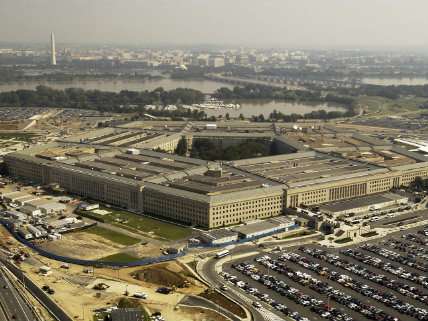Military Leaders Skeptical, "Embarassed" By Administration's Push for Strikes Against Syria, Says Former Army Major General

The Washington Post is running an absolutely brutal op-ed by retired Army major general Robert Scales on military opposition to the White House push to attack Syria.
Scales, a former commandant of the U.S. Army War College, says his piece is based on dozens of personal exchanges with current and retired soldiers. It lays out what he describes as the "overwhelming opinion" of those currently serving in the military. According to Scales, they are not at all enthusiastic about the administration's plans for going to war:
They are embarrassed to be associated with the amateurism of the Obama administration's attempts to craft a plan that makes strategic sense. None of the White House staff has any experience in war or understands it. So far, at least, this path to war violates every principle of war, including the element of surprise, achieving mass and having a clearly defined and obtainable objective.
They are repelled by the hypocrisy of a media blitz that warns against the return of Hitlerism but privately acknowledges that the motive for risking American lives is our "responsibility to protect" the world's innocents. Prospective U.S. action in Syria is not about threats to American security. The U.S. military's civilian masters privately are proud that they are motivated by guilt over slaughters in Rwanda, Sudan and Kosovo and not by any systemic threat to our country.
They are outraged by the fact that what may happen is an act of war and a willingness to risk American lives to make up for a slip of the tongue about "red lines." These acts would be for retribution and to restore the reputation of a president. Our serving professionals make the point that killing more Syrians won't deter Iranian resolve to confront us. The Iranians have already gotten the message.
Our people lament our loneliness. Our senior soldiers take pride in their past commitments to fight alongside allies and within coalitions that shared our strategic goals. This war, however, will be ours alone.
They are tired of wannabe soldiers who remain enamored of the lure of bloodless machine warfare. "Look," one told me, "if you want to end this decisively, send in the troops and let them defeat the Syrian army. If the nation doesn't think Syria is worth serious commitment, then leave them alone." But they also warn that Syria is not Libya or Serbia. Perhaps the United States has become too used to fighting third-rate armies. As the Israelis learned in 1973, the Syrians are tough and mean-spirited killers with nothing to lose.
Scales is only the latest cmilitary official to express skepticism about the administration's push for war. Last week, The Washington Post published a lengthy report on doubts about the effort within the military. Here's a representative sample:
"I can't believe the president is even considering it," said the officer, who like most officers interviewed for this story agreed to speak only on the condition of anonymity because military personnel are reluctant to criticize policymakers while military campaigns are being planned. "We have been fighting the last 10 years a counterinsurgency war. Syria has modern weaponry. We would have to retrain for a conventional war."
The New York Times recently aired this bit of skepticism about the administration's preferred approach to the strikes:
Weapons experts said that Tomahawk missile strikes, while politically and psychologically significant, could have a limited tactical effect. The weapons are largely fuel and guidance systems and carry relatively small high-explosive warheads. One conventional version contains about 260 pounds of explosives and another version carries about 370 pounds. Each is less than the explosive power of a single 1,000-pound air-dropped bomb.
The weapons are not often effective against mobile targets, like missile launchers, and cannot be used to attack underground bunkers. Naval officers and attack planners concede that the elevation of the missile cannot entirely be controlled and that there is a risk of civilian casualties when they fly slightly high.
Some officials have also cautioned that Iranian-backed Hezbollah militants might step up terrorism around the region in reaction to American strikes on Syria. Another risk is that Mr. Assad might respond to the attack by firing missiles at Turkey or Jordan or mounting even more intensive attacks against civilians.
The White House response, meanwhile, has been to be upset with the Pentagon's off-message leaks.
So here's where we're at: A large majority of the public opposes attacking Syria. Our closest international ally voted against participating in a strike. The U.S. Congress hasn't voted yet, but it's far from clear that legislators will approve a strike when a vote occurs. And it seems that there's a fair amount of skepticism within the military as well. At this point, you have to wonder who, exactly, supports starting this war.


Show Comments (110)